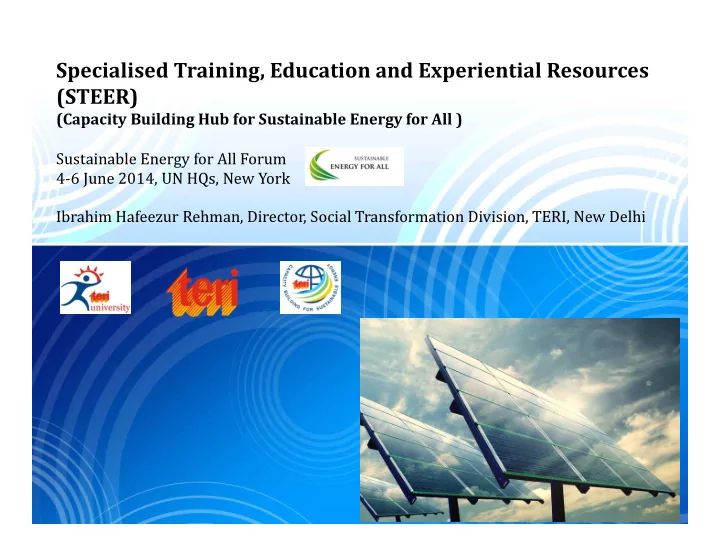

Specialised Training, Education and Experiential Resources (STEER) (Capacity Building Hub for Sustainable Energy for All ) Sustainable Energy for All Forum 4-6 June 2014, UN HQs, New York Ibrahim Hafeezur Rehman, Director, Social Transformation Division, TERI, New Delhi
A global capacity building, demand-responsive, hub for all key stakeholders of the SE4ALL initiative. STEER is jointly hosted by TERI (The Energy and Resources Institute, New Delhi) and the TERI University Vision To create the confidence, through building requisite capacities, in all stakeholders of the SE4ALL initiative to deliver on the SE4ALL goals
Governance Structure International Steering Committee (ISC) � Would comprise representatives of major donors, Development and Delivery partners and would inform the focus and priorities of STEER activities � Would also provide guidance on modes of capacity development, facilitate fund raising and act as a quality assurance mechanism at the process level � Would approve the budgets of the STEER and identified activities and facilitate a viable financial model
STEER approach
Going beyond training . . . Case studies as � Linkages with other � Hubs learning resources � Database of specialized expertise identifiable by IT-enabled � geography and skill sets repository to capture, organize, � Peer learning platforms and categorize � Process Documentation capacity building � Organisational models tools Human resource Skill sets development MIS for energy � Knowledge Organizational systems resources development Institutional frameworks Training - Legal framework Online • Model regulatory Policy and � Design and Face to Face frameworks and regulatory development of framework policy tools quality-assured • Tariff regulation and content for hybrid determination tools delivery of training • Grid codes and grid � Training of trainers integration � Make available regulations training resources – human and material
Key elements of training Collaborative module development in terms of hours of learning Development cost/hr $ 10000 - $ 15000 – repeat usage –per person cost minimal, goes on decreasing with increase in outreach -Business model collaborate and co own (License rights for a fixed period)
Labs and related infrastructure - Real, Virtual and Remote Access � REEEP � AEI
Illustration….. module development We gratefully acknowledge the support and collaboration of DFID for initiating capacity building activities related to energy access
Each stakeholder has: • Varying training needs • Different objectives • Diverse resource capabilities Distributor Manufacturer/ System integrator What are the training objectives? Strengthening What should be the training content? Creation & Strengthening Who should train, and for how long? Creation How should the training be delivered?
Technology Manufacturer Distributor Energy Enterprise End User Developer /System integrator Appropriate sizing, Role of Awareness design and Product and spares Technology generation and optimization Pre-institutionalization stock management advancement on sensitization improving How to establish How to select best Institutionalization efficiency , strategic tie up with monitoring & fit technology- reliability and other energy documentation technology sourcing flexibility of the technology supplier Operationalization system Standards and test Business creation methods Scaling up Design improvement and Quality assurance optimization and control at production stage Hourly modules with diverse tools –video lectures, films, lab demos, step by step audio visual guides, field demonstration, real and virtual labs, etc
Understanding technology options, technology sourcing � Estimating market potential- What is the market size � Pre- Business prospect and financial viability – Which options are � institutionalization making business sense, cost and benefits Different programs and funding options available � How to establish and institutionalize energy enterprise, regulatory � requirement Institutionalization What should be the marketing strategies � How to do branding � Technology sourcing � Supply chain and inventory management � Operationalization Book keeping and accounting � Quality Assurance and Quality control, After sales � Price fixation and negotiation with manufacturers � Financial and regulatory Management � Franchisee creation and management � Up-scaling
Comments/Suggestions?
Recommend
More recommend